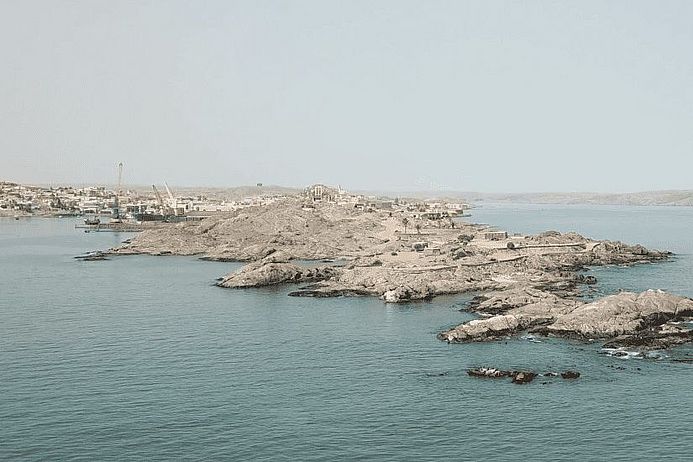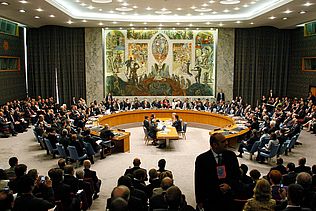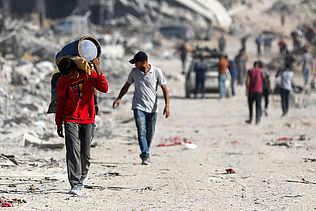If Germany can use the genocide of Jews to justify its support for warfare that large parts of the world regard as genocide, nothing can be trusted at this point. The humanistic substance of the official culture of remembrance is proving to be frighteningly thin - thereby also shattering the belief that commemorating Nazi crimes will somehow help to prevent fascism and authoritarianism coming to the fore again in the future. Instead, we are being confronted with a repressive raison d'état that cloaks authoritarianism in an ethical garb.
The extent of the moral and intellectual crisis surrounding all of this is still hard to gauge. In Germany, new traces of division and alienation have been rippling through a society marked by immigration flows ever since "memory work" was leveraged as a boomerang to stigmatise minorities. In global terms, the Italian historian Enzo Traverso sums up the magnitude of the crisis like this: "How can the memory of the Shoah be defended at all after it has been used to legitimise genocide?" Remembrance of the Holocaust is in peril of being turned into a weapon of Western dominance, posits Traverso in his forthcoming book "Gaza devant l'histoire".
Gaza before history means, among other things, that the struggle for a more just, inclusive world memory has entered a startling new phase, displaying dystopian and utopian elements. Those who justify the mass killings in Gaza as defending Western values are now rejecting efforts to elevate colonial remembrance with extraordinarily callous enmity. Post-colonial thinking is being labelled genuinely anti-Semitic; demonisation is regularly followed up with calls for a purge of academic and cultural life.
Fatal relationship
The only way to defy this discursive madness is to reflect on universal principles of human equality. But how? "From Windhoek to Gaza" is a slogan to be heard at demonstrations; it establishes a continuity between German perpetration of crimes back then and complicity in the present day to form a genocidal continuity. I think one can more aptly speak of a fatal relationship, namely a pejorative view of the victims, turning them into people of a lower category, into beings of subordinate importance. The most important lesson from the Holocaust, that every life is of equal value, is a notion that has become alien to official Germany. And this translates into a hierarchy: it places today's Palestinians in a category similar to victims in colonial history, but also degrades non-Jewish victims of the Nazi programme of extermination.
Raison d'état has no place for the genocide of Roma and Sinti. "Do we have to have a country in whose name people are killed in order to be recognised?" a Roma activist recently asked sarcastically. Two Nazi genocides with often identical extermination camps and yet such contrasting repercussions for the politics of remembrance. Using the term Holocaust to refer to both groups of victims, as historian Ari Joskovicz does in his study "Rain of Ash. Roma, Jews, and the Holocaust", is proscribed in Germany. The climate of dividing and categorising is so deeply engrained that people from Jewish, Palestinian, Ovaherero and Roma communities recently had to meet in a tucked-away safe house in Berlin when they wanted to discuss solidarity.
This other dialogue of solidary needs support in order to become public – based on the awareness that crimes are not "balanced out" if their victims are treated with equal respect. In this sense, a post-colonial view of genocide is entirely compatible with the specific nature of the Holocaust. Five centuries of colonialism witnessed a chain of extermination perpetrated on populations deemed superfluous, disruptive or threatening. Anyone familiar with this history of mass violence does not equate "genocide" with the Holocaust and consequently does not relativise the extermination of Jews when a similar accusation is levied against Israel. Because postcolonial thinking encompasses wider facets of violent behaviour, it could even help to de-escalate the discourse.
Binary logic
In Israel, however, the view persists that a genocide must look like the Holocaust to merit the term, with gas chambers and innocent victims who are exterminated down to the last member. Even the genocide of the Armenians, some of whom fled to Palestine, is not afforded recognition in Israel. On the other hand, the international movement against the Gaza war has little room for a reminder of Edward Said's plea to "accept the Jewish experience with all the horror and fear it entails". The categories of Zionist and genocidal are sometimes heedlessly moved close together, as if even running a Jewish museum is an offence. Those who do not distance themselves are held to be complicit – this erroneous binary blueprint was rightly criticised when Russian musicians had to distance themselves from Putin in order to be able to perform in Germany.
Committing genocide, supporting it through complicity and not wanting to see the complicity are three different things. The first two are criminal offenses, while the third is a moral offence that can be rectified. Anyone who mixes them up makes everyone an offender and appoints themselves the sole judge. Wherever there are no grey areas, a slogan like "Zionists have no right to live" can emerge, rejected by a minority of a movement, but not loudly enough. And since politicians and the media in Germany have branded use of the term genocide as anti-Semitic, there no longer seems to be any good reasons to avoid the term, although a movement against war crimes could have gained more breadth.
Malcom X meets Fritz Bauer
Ever since Malcolm X travelled to Gaza in 1964, the humiliated and disenfranchised have identified with the fate of the Palestinians; their situation has become a mirror of a world characterised by injustice. The Gaza war is now exposing in an extreme way how the West applies double standards, but this sinister climax is also the tipping point of an era. The Palestinian cause resonates so widely because the global balance of power is changing, while at the same time Israel's crimes are torpedoing the mechanisms previously protecting the Jewish state. "We are approaching a moment, or perhaps it is already here, when memory of the Holocaust no longer prevents the world from seeing Israel as it is," writes Israeli human rights activist Hagai El-Ad. History no longer serves as an "iron dome that protects us from being held accountable."
Multiple ambivalence is the hallmark of a world lying between the symbols of Windhoek and Gaza. On this uncertain ground, alliances need to be forged for an indivisible humanism. When 81-year-old former minister Heidemarie Wieczorek-Zeul was recently asked how 20 years ago she came to ask for forgiveness for the genocide committed in Namibia, her answer was that she was influenced by Fritz Bauer, initiator of the Frankfurt Auschwitz trial in 1963. "His basic approach was: anyone who denies others their humanity is on their way to the abyss."
In 2022, Charlotte Wiedemann published the highly acclaimed book "Den Schmerz der Anderen begreifen. Holocaust und Weltgedächtnis", which she also discussed in a medico podcast at the time.
Namibia
To this day, Germany refuses to recognise its genocide of the Ovaherero and Nama in present-day Namibia. Instead of reparations, the German government is offering development aid and pursuing its own interests: Hydrogen from Namibia is supposed to make the German economy viable going forward. medico partner organisations are fighting for recognition and independence.
medico is currently supporting the Nama Traditional Leaders Association (NTLA), inter alia in organising the Genocide Memorial Walk in Lüderitz Bay. As part of a self-organised culture of remembrance that keeps alive the memory of the genocide and its aftermath, Nama and Ovaherero from various regions of Namibia regularly get together here. This year, Forensic Architecture also presented the initial results produced by genocide research there. Another meeting organised an exchange on the German-Namibian hydrogen project.




